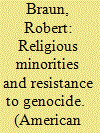| Srl | Item |
| 1 |
ID:
134937


|
|
|
|
|
| Summary/Abstract |
Why do some terrorist organizations, but not others, adopt suicide bombing as a tactic? Dominant accounts focusing on organizational capacity, ideology, and efficacy leave certain elements of the phenomenon unexplained. The authors argue that a key factor that influences whether a terrorist organization does or does not adopt suicide terrorism is cultural resonance. This is the idea that deep and specific cultural logics, which transcend religion and nationalism, enable and constrain the sorts of instrumental behaviors that can be utilized in the pursuit of group goals. The article investigates the role of a well-established cultural orientation of collectivism, which enables the authors to measure culture systematically. Case studies, survey data, and experimental research are used to illustrate that collectivism lowers the cost of adoption by facilitating the recruitment of attackers and reducing societal backlash against self-sacrifice. The authors then test for the relationship between collectivism and suicide-bombing adoption using an event history analysis framework, finding a strong correlation.
|
|
|
|
|
|
|
|
|
|
|
|
|
|
|
|
| 2 |
ID:
145089


|
|
|
|
|
| Summary/Abstract |
This article hypothesizes that minority groups are more likely to protect persecuted groups during episodes of mass killing. The author builds a geocoded dataset of Jewish evasion and church communities in the Netherlands during the Holocaust to test this hypothesis. Spatial regression models of 93 percent of all Dutch Jews demonstrate a robust and positive correlation between the proximity to minority churches and evasion. While proximity to Catholic churches increased evasion in dominantly Protestant regions, proximity to Protestant churches had the same effect in Catholic parts of the country. Municipality level fixed effects and the concentric dispersion of Catholicism from missionary hotbed Delft are exploited to disentangle the effect of religious minority groups from local level tolerance and other omitted variables. This suggests that it is the local configuration of civil society that produces collective networks of assistance to threatened neighbors.
|
|
|
|
|
|
|
|
|
|
|
|
|
|
|
|